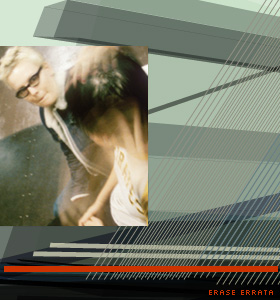Wednesday, February 18, 2026 |
||

ERASE ERRATA'S POST-RIOT GRRRL, POST-FEMINIST POST-PUNK // The Bay Area quartet creates a new kind of noise. |
|
| Interview Jenny Tatone Photography Jim McGinnis | |

Bianca Sparta (left) and Jenny Hoysten "I like it when [the audience gets] really sweaty and energized and then, after the show, they can't stop dancing or moving around. And they run around outside and everyone's really hyper and yelling. It becomes like chaos. I'd like to incite a riot, but a nice one." — Jenny Hoysten |
Tatone: Well, what it's about lyrically, and aren't there a
couple different titles, or maybe a couple different track numbers,
or there's no number?
Hoysten: OK, right. I wrote that right before and probably during the dot-com bust that was going on. I was watching and reading about other countries and the class wars that were going on and thinking about the class conditions of where I was living and the area where I was living and working. It was so impressive to me how restrained we were and how polite we were about all the injustice. I felt like we were all just eating shit and smiling. And the song came out of that and it just exploded. Most of the lyrics are improv [that come] during practice. Normally, I've got a theme in my head of something I'm thinking about and it just builds from there. The beginning of the song is about how everyone thinks San Francisco is such a lovely city. And how even down at the Fisherman's Wharf, the mayor is on a big-screen TV that's on the side of the building going: "Welcome to San Francisco, our people love to play host to you." And then there's all these homeless people lying on the ground that obviously have no means to play host to anyone. It started with that whole thing. It was good to move to Oakland, but Oakland will probably be experiencing something like that really soon. But getting away from it and trying to find a community that was a little more where we were. The class divisions aren't as distinct over there — we're all pretty low-income, and a lot of people in Oakland are. There's certainly parts of town in the hills where people have some money, but for the most part it's a working-class town. Jaffe: But at the same time I definitely think, although it's really hard, there's a lot of positive activities going on in San Francisco, like neighborhood community-oriented kind of things. Hoysten: Yeah, they're trying to reorganize now, and I think it's a perfect time, too, 'cause the dot-coms are pulling out. I think it's an important time for people to organize as far as neighborhood coalitions go. Tatone: So far, as artists, what have you encountered or experienced for the first time as the result of being in a band? Something maybe that you never would've expected? Hoysten: Are you talking about being in this band? Because I think everyone has been in multiple bands. Tatone: You can talk about either. Hoysten: This is the first band that I've ever sung in, been a front person for. I've been in bands — Bianca and I, in our two-piece, I sang and played guitar. But this actual experience for me feels a lot like performance art. Normally, I'm just a musician. In the other bands I'm in I feel like that's my role. But now, I feel like I'm experiencing an engaging [physically]. So that's a first for me. Artistically, I've really learned from that. Sparta: I feel fortunate to get to meet a lot of nice people just because we get to travel so much, meeting a lot of people and going places where I probably would've never traveled before. Getting to see a lot of the United States is really exciting. Erickson: And in a really great way, not just going to the tourist sites, but going where people like yourself would hang out, and meeting people there. Jaffe: Definitely, I think for all of us, just playing with people who have the same musical ideas in a way — it's like what we, in our head, had thought we wanted to do. And then it all comes out on the pages the same way together — it's really amazing. Hoysten: That's been really great meeting musically like-minded bands and finding people like that, because we definitely have a lot socially and politically in common with a lot of the bands. It's really neat to see the underground people who aren't playing traditional music. Tatone: Are there any specific bands you feel especially connected to? Sparta: There's a lot. Hoysten: I feel like if we started naming names, we'd leave someone out. I mean, we've found a lot of really neat bands. Tatone: Could you talk a little about your reaction to the U.S. response to the terrorist attacks? The bombings, the embraced patriotism, the media, etc. Sparta: I don't really wanna talk about it. Hoysten: We're all very concerned about our civil liberties right now, like intelligence, but that's probably as much as we wanna say. Jaffe: My folks live right outside New York so my response to the whole thing has been really personal. Hoysten: Oh, what a mess. |